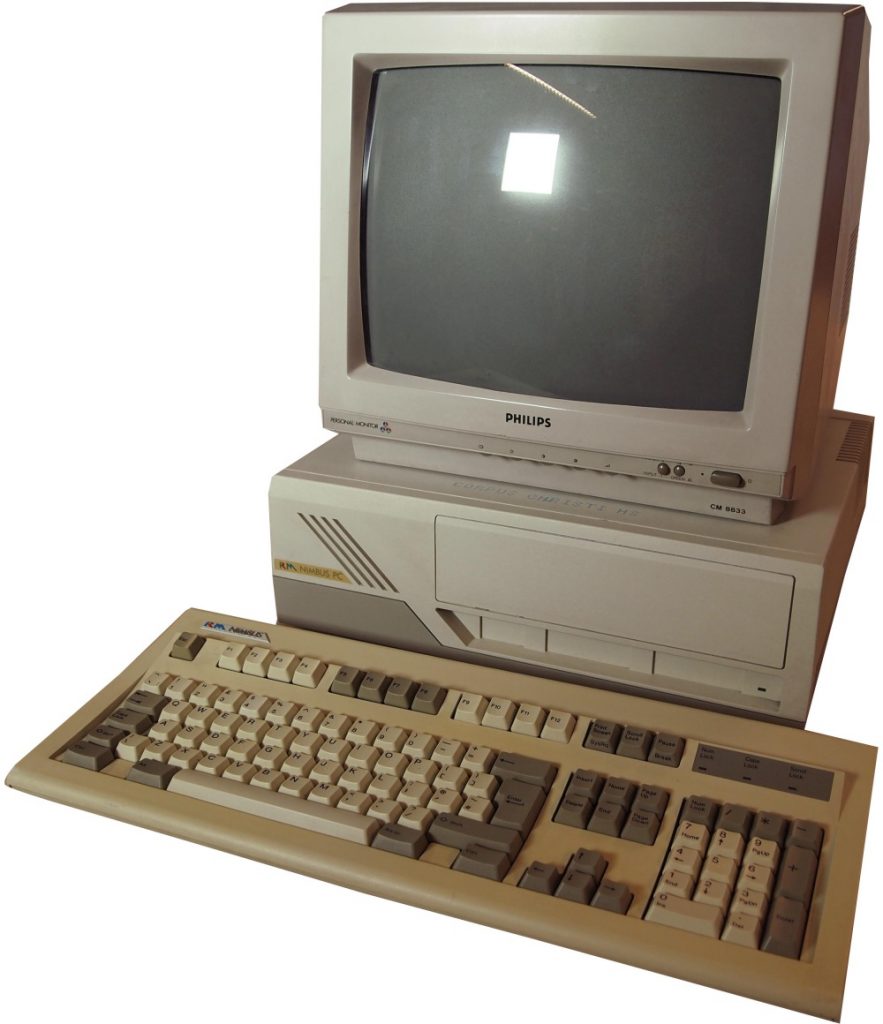We proudly bought our first personal computer in 1990. We thought we got quite the deal, too; we drove all the way to a Sam’s Club and spent just over $1000 on a desktop computer with Windows 3.1 (… I think), DOS, and a 20 MB hard drive with something like 16K memory. We brought it home and discovered that they’d accidentally given us the other choice in desktop computers: one with a 40 MB hard drive! I remember calling the store and they told me it was their ($700!) mistake, so congrats!
Mind you, that might have been our first computer, but I’d worked with computers, before. I started back in late high school in an Explorer Post (BSA) that centered on computers; they were the size of rooms, back then, and we got to program a Snoopy calender in Fortran. WOOHOO!! And after that, I was the point person for computer stuff in an office I worked at for a couple of years. So, naturally, I thought I was an expert.

Which is why we took it home and I immediately reformatted the hard drive… without realizing it had already been done. Yes, I recovered from that failure, and that was just the beginning of a long line of failing with computers. I learned a lot by screwing up. And thank goodness for that, since I’ve been working with computers in one way or another since then, most of that time online. (Hello, modem installation back in December of 1990! Turn off call waiting so it doesn’t boot you offline!)
I’ve had plenty of other failures, too. You name it, I’ve failed at it. And mind you, I dearly want to be good at everything I undertake. That’s my nature; I want to excel, and I have had to fight the tendency to want to give up when I fail. If I can’t be good at it, I don’t necessarily want to do it. I was a perfectionist early on, and I have struggled with that my entire life.
In fact, while examining why I haven’t conquered my weight and health issues until late in life, I had to come to the difficult realization that not only had I failed at every single previous attempt over the course of my lifetime, but I also had not embraced efforts to work on my health issues because of fear of failure. I’d failed at even the most previous notable effort of losing 140 pounds; while I had lost the weight, I hadn’t fixed what I needed to fix, and it took me a long time to come to terms with failing myself in that regard.
The great thing about failure is that it gives me the opportunity to learn lessons if I will only be open to that learning. I wouldn’t have become as proficient with tech if I hadn’t learned from my failures. As a musician, it’s up to me to practice through failure until I achieve what I want.
Putting weight loss and health issues into perspective is much the same. The difference, for me, is that while I now consider weight loss to be a side effect of getting healthy, it’s also a very noticeable aspect to others. At 371 pounds after having lost 140 pounds and then regaining all of that plus more, I often felt humiliated seeing people who knew I had failed at my efforts. When you’re consistently the largest person in any room, and then you lose any noticeable amount of weight, it draws attention and well-meaning comments as well as praise.
It’s one thing to fail in private. It’s quite another to fail out loud, where everyone knows exactly what you’ve done. On top of that, our culture has an inherent character assessment tied to weight; obese people are often seen as lazy, stupid, gluttonous, unworthy. If only they’d stop shoving food in their faces! It’s just so easy — calories in, calories out!
Friends, if it were that easy, the weight loss industry wouldn’t be a multi-billion dollar industry. In fact, it’s an industry that thrives because we fail. When I realized that simple fact, I also realized that any long-term success had to be built on discovering for myself what works for me. Which meant building on previous failures.
I am where I am right now because I have been open to learning from failures. As the song says — I win some, I learn some. I’ve had to take my ego out of it and not worry about societal pressures, and simplify my view to analyze whether a change I implement is working. It’s definitely a scientific approach, but it’s much the same approach I have taken over the years to excel at tech as well as becoming a better musician. In those worlds, if something doesn’t work, you change it until it does. This has also become my approach to bettering my health.
While I have spent innumerable moments regretting that I didn’t allow myself to learn about such things much earlier in my life, I now see failure as simply a step in the process rather than an indictment of my character. Making that change has been crucial to continued success, and I’m no longer fearful of failure.